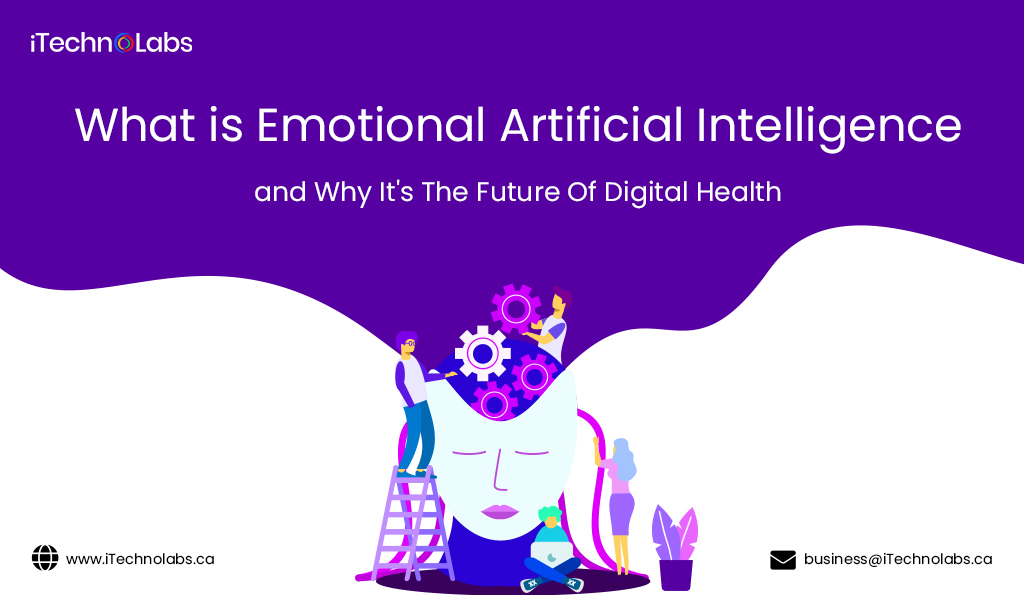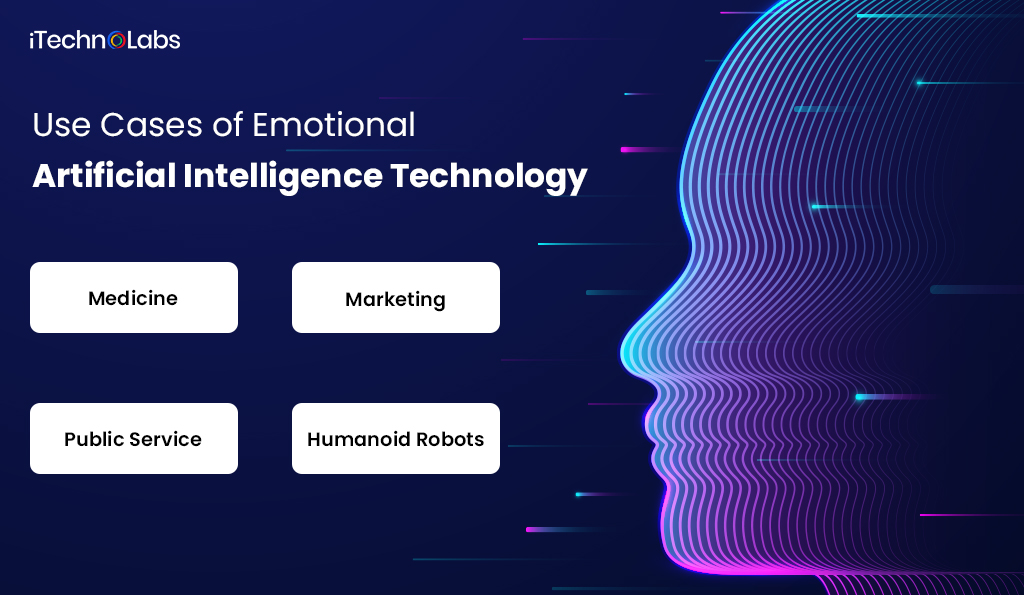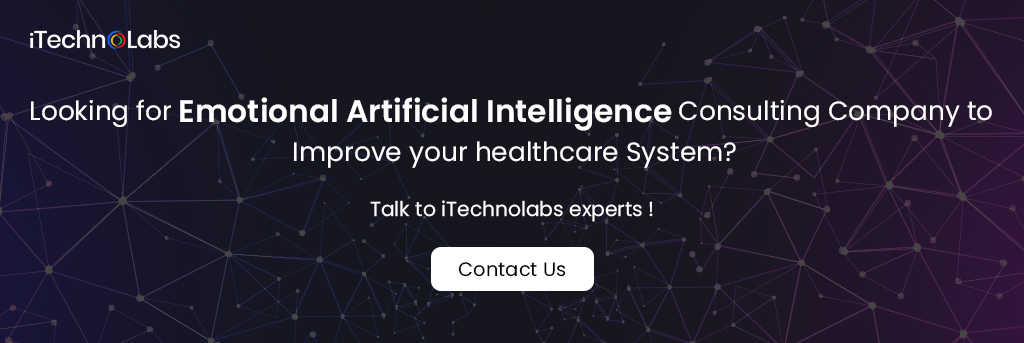Last updated on August 10th, 2023

In our day-to-day life, we use hundreds of cues such as intonations, facial expressions, posture, gestures to communicate our feelings and emotions. It is important to read & decode all the hidden signals for effective communication. Humans are always an expert in recognizing human gesture and emotions, but can an intelligent technology do it?
Emotional Artificial Intelligence – An Intelligent Human Face
AI has penetrated our business activities and day-to-day lives already turning closer to the circle of human feelings and emotions.
Artificial intelligence is a computer science field whose main focus is to build machines that copy human behavior. AI has done remarkably in the past that made it trending in the last few decades and the technology is going to ace the trend in the upcoming years. According to the studies also, it is proved that 41% of consumers conclude that Artificial intelligence will improve our lives to an extent and 77% of devices operated by us will have artificial intelligence features in one or the other form.
Emotional Artificial Intelligence is an AI subset that allows computer algorithms and systems to recognize and interpret the feelings and emotions of humans by tracking their speech, body language, or facial expressions. In brief, we can explain emotional AI as a tool that can enable natural interaction between humans and machines: it analyzes subtle signs in the voice patterns, person’s mimics, gesticulation and gives them human replicated responses.
By 2026 the global emotion detection & recognition market is expected to expand to USD 58.3 from USD 19.5 billion in 2022. With the software tool, facial expression recognition technology is projected to boom at the highest rate in the forecast period.
-
Software to recognize facial emotions
Machine learning and computer vision development make emotional expression recognition much convenient, accessible, and accurate to the end-user. Face computing or facial recognition is a subcategory of image processing. In many cases, it recognizes the emotion of the humans passing through their cameras.
It is used in industries or segments that need to understand in-depth human emotions to respond to specific activities. The technology of facial recognition can very well be applied in multiple security cases including authentication, access control, payment verification, and also for interrogations and taking interviews.
-
Emotional Artificial Intelligence Working Process
Emotion artificial intelligence in facial expressions measures facial detection using an optical sensor like a smartphone camera in an image or pre-recorded video for detecting a human face in real-time. The computer vision algorithm identifies the main features of a human’s face: nose tips, eyes, mouth corners, etc., and tracks the movement to interpret the emotions. With the help of this encrypted data to a big library of template images, the software of facial detection can examine the person’s feelings and emotions with these facial expressions. Extra features of the software can also include facial verification and identification, gender and age detection, multi-face and ethnicity detection, and much more.
-
Software To Recognize Voice Emotion
The next stage of natural language processing recognizes human behavior and emotions with the help of their voice. The software of voice recognition enables the process of audio files containing the human voice and analyzes what is said and extracting the features of paralinguistic by observing the changes in the loudness, tone, tempo, qualities to distinguish age, gender, etc., and interpret human emotions. Many big brands in multiple industries use emotion detection and voice analysis, including call centers, healthcare, market research, and many more.
How does voice recognition work?
The software of voice recognition works similarly to facial emotion recognition. The remarkable technology understands the pitch of the user with the help of machine learning. The emotional state of the user from the high level of user’s accuracy of being sad, surprised, happy, angry or has a neutral state of mind to acoustic speech. This makes the work of many companies to identify their employees’ state of mind easier.
Multimodal Emotion Recognition
If we consider personal communication 7-38-55 rule, 7% is the influence of the words of the affective state perception. 38% accounts for non-verbal messages and 55% accounts for body language. Emotional intelligence machines will capture all non-verbal and verbal cues to acknowledge the human state by using voice or face recognition or both. The main motive of multimodal emotion recognition is to make human-machine communication look more natural. However, a lot of controversies are going on around the topic. Do humans want their emotions to be machine-readable? Let’s keep this question for the data ethics. Nowadays, we have already seen multiple examples of emotional AI applications.
Emotional Artificial Intelligence Technology Uses

-
Medicine
1. Mental health treatment
Chatbots are emotional AI-powered that can mimic a counselor or therapist and help automate accessibility and therapy. Even on the online platform, mood tracking apps are available, such as Woebot that help humans manage their mental health through small conversations, games, mood tracking, video curation, etc. The wearable olfactory display is another AI-powered technology for assisting people with mental health. MIT Media Lab developed this software. It will help track the information on the wearer’s cardio-respiratory and release a different combination of scent when required for the treatment of psychological problems, such as anxiety and stress.
2. Emotional support
This is the best facility offered by emotion AI. Nurse bots remind the patients not to forget to take their medication and communicate with them daily to look after their wellbeing.
3. Medical assistants with AI
Emotion AI assists doctors with intervention and diagnosis and offers better care. Affectiva, an application that enables patients to measure heart rate without wearing the sensors. The application program can easily capture the change in color on the patient’s face during the diagnosis
4. Responsive Emotionally Virtual Assistants
Virtual humans like Alexa and Siri are not completely designed to answer all your questions, but they are supposed to act and look like humans, have unique personalities, show emotions, learn & have real talks
-
Marketing
Knowing and understanding the consumer’s emotional responses to the brand content is important to reach the marketing goals.
-
Advertising research
The core of effective advertising is emotion: if there is a sudden shift of emotions from negative to positive, sales can increase. AI-powered emotion solutions such as Affdex by Affectiva enables marketers to measure consumers’ responses remotely to ads, TV shows, and videos and evaluate their relevance.
-
Personalization
If you have a better knowledge of human emotions, it helps you respond to marketing campaigns with the ability to deliver accurate content through accurate channels at the right time
-
Public Service
-
Surveillance
Public places cameras can easily detect people’s moods with the help of facial expressions. China, the biggest hub of the surveillance market, is trying to predict crimes with the help of AI to examine the citizens’ emotional state.
2. Insurance
With the help of Emotion AI technologies, companies can detect fraud and conduct a risk assessment in real-time insurance claims by using facial and voice recognition.
3. Banks & financial institutions
Fraud intention detection, credit risk assessment, risk scoring, and immediate fact verification. Also, emotion AI can set up biometric face recognition, the personalized payment experience, etc.
4. Law enforcement
The technology AI emotion detection enables real-time reaction analysis in the suspects at the time of interrogation to analyze video recording and audio. Also, such techniques are best to use for sensitive job role recruiting.
-
Humanoid Robots
Sophia is the best and most known example of advanced AI. It is a citizen robot by Hanson Robotics. Such human-robot technology is engaged mainly in customer service: robot-receptionists in Tokyo, Japan, are a great example. T-HR3 by Toyota can easily mimic the human operator’s movement. There are educational robots that can read emotions and enable customized teaching activities. This can be a great and effective solution for inclusive emotions.
Looking for Emotional Artificial Intelligence Consulting Company to Improve your healthcare System?

The technology is facing getting a boom in upcoming years and will be trending in upcoming years. Hence, adopting the new AI technology is new normal and you need someone to make you understand it better. iTechnolabs has years of experience in executing AI recognition services in multiple clients’ projects. We know how we can add the trends to add innovation and versatility to your business.
Visit our website or connect with us now to get the most out of the best with Emotional Artificial Intelligence technology.
Frequently Asked Questions For Emotional Artificial Intelligence
-
What must be the key characteristics of custom emotion detection software solutions?
Given below are the must-have characteristics of customised emotion detection software –
- What would an emotion detection software be if not precise in detecting emotions?
- The functionality of an emotion recognition software can also be measured via how easily it can be integrated with your app
- Obviously, the software must be able to scale up to meet the rising demands of your business
- With usage of major biometrics information, it becomes essential for the software to have robust security infrastructure
- The emotion detection solution must not be limited to only simpler emotions that can be easily detected
- The emotion detection software will be dynamic if it can offer the emotion recognition results on real-time basis
- The emotion recognition system must compatible with diverse operating systems
2. Which is the top custom emotion recognition software development company?
Given below is the list of A-one custom emotion detection software development companies. Take a look –
- iTechnolabs
- Megvii
- Ntech Lab
- Emozo Labs
- IBM
- Behavioural Signals
- Amazon
- iMotions
- AdMobilize
- Imentiv AI








